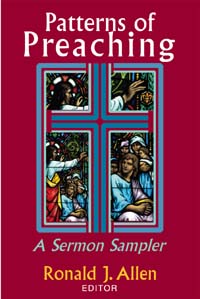
Patterns of Preaching can be used as a companion to Interpreting the Gospel or as a separate resource for homiletics courses.
"'Patterns of Preaching' is yet another useful text from Ron Allen, professor of New Testament and Preaching at my seminary. This text is a collection sermons with commentary, showing overall the primary point that there is no single 'right' way to preach. There are preachers past and present who develop a certain style, and others who advocate the importance of certain methods, but what Allen has done in this text is show that the most important thing, beyond style, beyond method, beyond all else, is to preach a meaningful message that is faithful to the gospel.
"This book is intended as a companion piece to Allen's text 'Interpreting the Gospel: An Introduction to Preaching'. Taken as a set, these give a thorough introduction to preaching, with theory, theology, and practical examples. 'Patterns of Preaching' has 34 different models of sermons given as examples (who knew there were so many varieties?) from classical and contemporary styles. Each sermon has commentary that includes the context of the congregation and occasion, since sermons often fail to make sense outside of their contexts.
"The first main section of the book looks at traditional patterns of preaching. These include the Puritan plain style, preaching verse by verse, inductive preaching, and preaching to make a point. Included in these sermons are essays and examples by noted preachers such as Susan Bond, Joseph Jeter, Henry Mitchell and Fred Craddock. Many sermons preached today still rely on these models that go back generations, if not centuries.
"The second section looks at more contemporary patterns for preaching. These include setting the sermon as a series of plots and moves (Buttrick style), sermons involving critical reflection and naivetes, sermons that draw from the arts, and sermons that follow the same idea as a novel would be developed. Preachers here include Paul Scott Wilson, Barbara Lundblad, Jana Childers, and David Buttrick.
"The third section looks at patterns by subject - here the reader will find examples of wedding sermons, funeral sermons, preaching on biblical themes, doctrinal themes, social issues, or even personal issues. Also included here is an example of a teaching sermon (while all sermons to a certain extent involve teaching, there are some times in the life of congregations a certain lesson needs to be made more explicit).
"The final section looks at theological topics in preaching. Here are five examples done in the evangelical, liberation, post-liberal, revisionist and postmodern theological styles. The intention here is to show how preaching can remain faithful to the gospel message and be adapted to different theological paradigms.
"In his introduction, Allen argues that most sermons fall into one of four broad categories: Expository-deductive, Expository-inductive, Topical-deductive, Topical-inductive.
"In expository preaching, the sermon's intention is to help the congregation understand its situation through a biblical passage or theme. In the topical sermons, the purpose is to develop a particular topic in light of the biblical texts. Rare is the sermon that does not do one of these two things.
"Likewise, the overall movement of a sermon generally follows one of two paths - inductive or deductive. Deductive patterns lay out the point at the beginning, and then develop it further. Inductive patterns lead up to a 'big finish' in which the point, if not discerned already from the sermon, is revealed. There are more deductive sermons among traditional patterns; there are more inductive sermons among contemporary ones. However, there are both styles to be found in each of the categories.
"Overall, this book represents a wonderful aid to preachers who might feel they are 'stuck in a rut', or to those who are doing well but welcome new inspiration. This is also a wonderful teaching tool for students, and would not be a bad investment for members of congregations generally, so that they can learn the different styles and patterns of preaching for themselves, so that they might become better listeners." - Kurt Messick
(Purchase of this book helps you qualify for the free shipping option if it is being offered at the time of your order.)